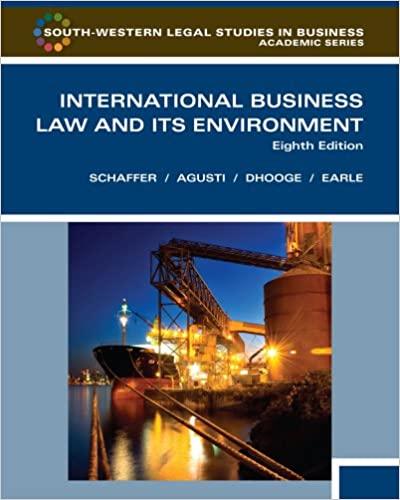Question
IMPLIED CONTRACT: APPLYING PRECEDENT Learning Objective: This Assignment has two purposes. The first is to learn the law of Implied/Quasi Contract. The second is to
IMPLIED CONTRACT: APPLYING PRECEDENT Learning Objective: This Assignment has two purposes. The first is to learn the law of Implied/Quasi Contract. The second is to practice Applying Precedent. The Legal Question: Implied/Quasi contracts are created by law when there is no express contract (no written or verbal agreement), but the parties' behavior is sufficient for an objective reasonable person to think there was a contract and it would be inequitable (unfair) for one party to receive that product or service without paying. When you look at Examples 11.6 and 11.9 in your textbook, you will see that these central concepts apply. Assignment PART ONE: Read these portions of the Seawest v. Copenhaver, NO. 65577-9-I, (Wash. Ct. App. Jan. 30, 2012) case. FACTS The main facts are undisputed. The Copenhavers own property in Washington State, but outside of a Development wherein Seawest maintains and operates a domestic water & distribution system. The Copenhavers paid Seawest for water services and related assessments until 2001, when they had a dispute with Seawest and stopped paying. Seawest sued for payment and since there were no
facts in dispute, they filed a Motion for Summary Judgment. The Copenhaver defended themselves by claiming that they did not have an express contract. The trial court granted summary judgment in Seawest's favor and the Copenhavers appealed. IN THE WORDS OF THE APPELLATE COURT: The law of Quasi or Implied contract addresses the issue of Unjust Enrichment. To establish an Implied Contract, the Rule requires there to be "A benefit conferred upon the defendant by the plaintiff; an appreciation or knowledge by the defendant of the benefit; the acceptance or retention by the defendant of the benefit; under such circumstances as to make it inequitable for the defendant to retain the benefit without the payment of its value." Undisputed evidence shows that the Copenhavers utilized the Seawest system and paid, without objection, for all water use, water maintenance, and assessment base charges to Seawest. The Copenhavers received quarterly water bills that show charges for "water base," "water usage," and "assessment base." The Copenhavers knew they were receiving the water and continued using it without paying. We conclude that the undisputed record supports a contract implied in law. The Copenhavers would be unjustly enriched at the expense of Seawest if they were allowed to retain the benefits of the water system without paying for it. The record supports a contract implied in law.
ANSWER THESE THREE QUESTIONS: 1. What legal defense (excuse) did the Copenhavers have for not paying their water bill? 2. List the requirements the Seawest court used to determine if an Implied Contract exists (there are 4). 3 | P a g e 3. For each of the requirements, state a fact from the Seawest case that applies to the rule and supports the Court of Appeal's conclusion that there is a contract implied in law between the Copenhavers and Seawest. {NOTE, there will be some repetition of facts.} PART TWO: You are now the Judge in the Theodore & Franklin vs Kitdoodle case. Read these facts: Facts: Theodore & Franklin developed Crazy Cat, a caricature of a Calico Cat with a "do-not-back-down" attitude. They promoted and marketed the character to KitDoodle, a popular supplier of cat food and cat products. Kipling, a marketing manager at KitDoodle, liked the idea. He presented it to the CFO (along with financial terms) who rejected it. Soon thereafter, the CFO approached the advertising agency KitDoodle usually works with and presented a "new idea" involving a Crazy Calico Cat. The company made the Cat the focus of its marketing, which was very successful. Nothing was paid to Theodore & Franklin. Theodore & Franklin sued KitDoodle for, among other things Breach of Implied Contract. {NOTE: although Theodore & Franklin likely have a claim for violation of Intellectual Property, this is a lesson in Contract Law, so focus on that.} ANSWER THESE THREE QUESTIONS: 4. Do Theodore & Franklin have an express contract with Kitdoodle? Explain. 5. Using the rule from the Seawest case, state a corresponding fact from the Kitdoodle Case to help you decide whether or not there is an implied/quasi contract between Theodore & Franklin and Kitdoodle. You should list 4 facts, one for each part of the rule. 6. What is your conclusion? Is there an implied/quasi contract between Theodore & Franklin and Kitdoodle? Explain.
Step by Step Solution
There are 3 Steps involved in it
Step: 1

Get Instant Access to Expert-Tailored Solutions
See step-by-step solutions with expert insights and AI powered tools for academic success
Step: 2

Step: 3

Ace Your Homework with AI
Get the answers you need in no time with our AI-driven, step-by-step assistance
Get Started


